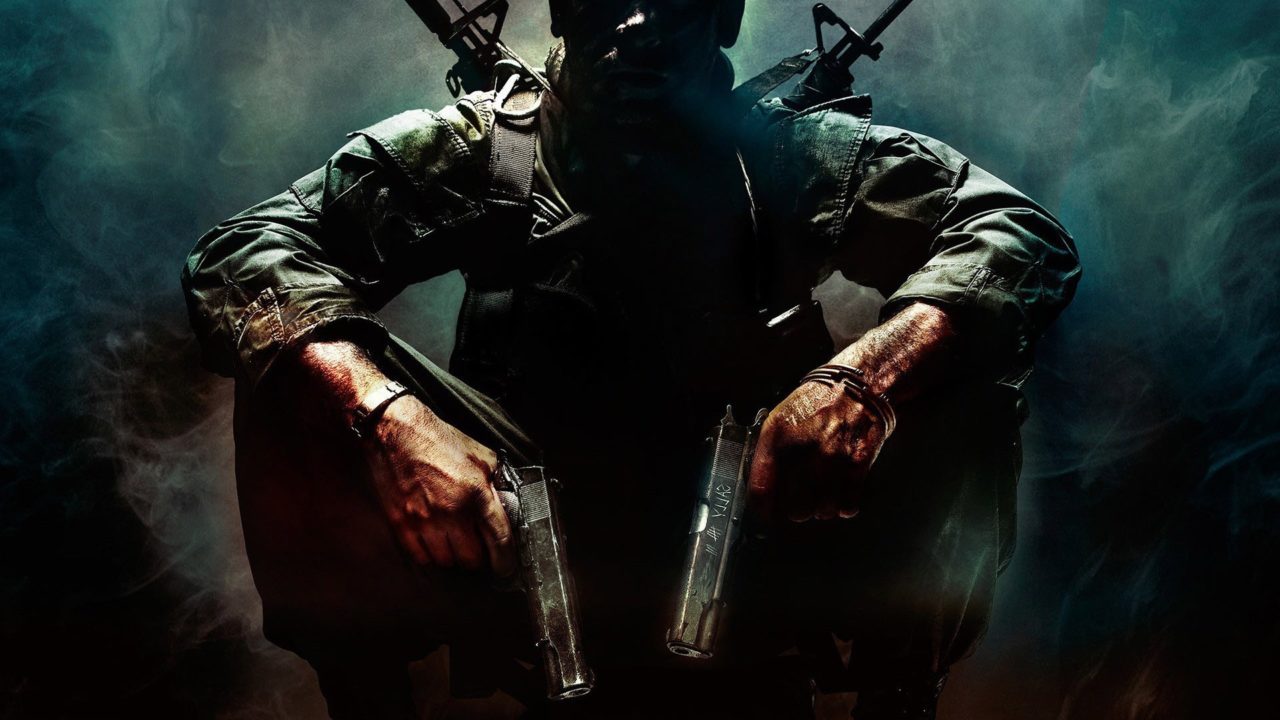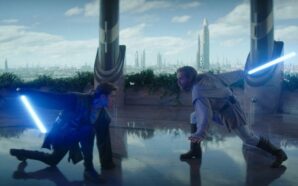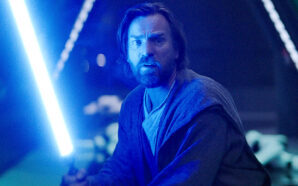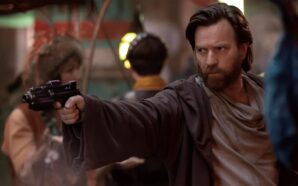After uprooting the Black Ops sub-series of Call of Duty from its 60’s setting and placing it further into the far future with every following instalment, Treyarch have finally returned to the cold war with, well, Black Ops: Cold War. Even though it has to navigate the treacherous waters of past canon, Cold War looks promising, especially after last year’s successful Modern Warfare reboot. The news of it being a direct sequel to the first game brought with it flashes of nostalgia for the earlier entry, and considering it’s the ten-year anniversary of its release, I thought I’d sit down and play through the game’s campaign – which I always considered the franchise’s best – for the first time in years. Despite my time away, replaying Call of Duty: Black Ops was almost muscle memory, and yet it wasn’t long before new revelations and opinions began to form on a game which I consider to be a cornerstone of my gaming history.
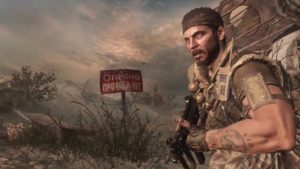 My first thought upon returning to Black Ops a decade after first playing it was, surprise surprise, the game looks 10 years old. While this is the most painfully obvious point on which to begin a retrospective, the aged look of Black Ops surprised me. I remember when the game looked so good! The beginning of the third mission always stood out to me – the pop of an incredibly well rendered Frank Woods against the teal and orange skies of Baikonur, just like a poster for an action movie. And not just in terms of stance and composition but the now overused colour scheme too. That once stunning image is showing its age and highlights a decade of technological advancements. However, those 10 years of aging actually suit the game. Given its cold war setting, Black Ops benefits from the now old and grainy presentation. It fits the setting and feel of the game, like watching an old movie on VHS instead of a 4K Blu-Ray. It just feels right.
My first thought upon returning to Black Ops a decade after first playing it was, surprise surprise, the game looks 10 years old. While this is the most painfully obvious point on which to begin a retrospective, the aged look of Black Ops surprised me. I remember when the game looked so good! The beginning of the third mission always stood out to me – the pop of an incredibly well rendered Frank Woods against the teal and orange skies of Baikonur, just like a poster for an action movie. And not just in terms of stance and composition but the now overused colour scheme too. That once stunning image is showing its age and highlights a decade of technological advancements. However, those 10 years of aging actually suit the game. Given its cold war setting, Black Ops benefits from the now old and grainy presentation. It fits the setting and feel of the game, like watching an old movie on VHS instead of a 4K Blu-Ray. It just feels right.
Happily, I can attest to the story not aging as much as the graphical presentation, with the campaign being as engaging today as it was a decade ago. Set across the 1960’s, beginning with the Bay of Pigs invasion and ending during the height of the Vietnam War, we play as CIA agents Mason and Hudson as they unravel a conspiracy to strike at the very heart of the West, and try to stop a cold war from heating up. The story is told mainly via flashback, with Hudson’s interrogation of Mason acting as a framing device which adds a sense of mystery to the narrative that’s missing from every other Call of Duty instalment. This truly is a compelling story to unravel and not just an excuse to start shooting bad guys.
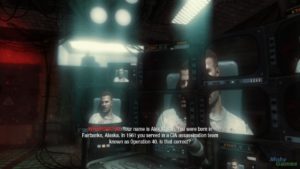 Upon revisiting the game, it’s clear just how much of a step up in storytelling for the franchise it is, and I’d argue it’s still unmatched to this day despite the narrative branches of some later games. Much of Black Ops’ success comes from its characters. Mason isn’t just a player surrogate who stays silent and watches the story happen around him like Soap or Roach from the Modern Warfare games. Mason is the story. His actions dictate everything, and he sure is vocal about it.
Upon revisiting the game, it’s clear just how much of a step up in storytelling for the franchise it is, and I’d argue it’s still unmatched to this day despite the narrative branches of some later games. Much of Black Ops’ success comes from its characters. Mason isn’t just a player surrogate who stays silent and watches the story happen around him like Soap or Roach from the Modern Warfare games. Mason is the story. His actions dictate everything, and he sure is vocal about it.
I care about these characters because they feel fleshed out enough for them to be just as at home in a television series as they are in this quick video game campaign. It’s also beneficial that no military jargon or procedure gets in the way of connecting to them, with the characters being known by their actual names rather than ranks or call signs. And, of course, there’s a great cast of voice actors, including Sam Worthington, James C Burns and Ed Harris. Also, no one shouts in a Russian accent quite as good as Gary Oldman who reprises his role of Reznov from World at War.
It struck me on this playthrough just how tight Black Ops’ narrative is. The franchise is known for its quick campaigns and large focus on multiplayer, but despite being able to beat it in a few hours, Black Ops feels grander than its Call of Duty contemporaries. Yet not one mission can be considered filler. Everything connects, whether to the wider plot or the themes. The game opens with a mission to infiltrate Castro’s compound and assassinate the Cuban leader, and really the only thing that needs to happen within is Mason’s capture so the true villains can be introduced at Vorkuta, where the game truly begins. And yet the opening isn’t a waste of a mission. Every detail is meaningful, from witnessing how Operation 40 operates to little moments like a discussion of Castro’s fanatical loyalists who do his bidding despite him meaning them harm, just like Mason and Reznov’s relationship later in the game. And it’s a wonderful twist to have the opening of the game be JFK sending Mason on an assassination mission considering the game ends with the reveal that Mason was then sent to assassinate JFK in return.
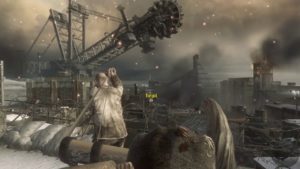 After Mason’s capture, we find ourselves in the Russian gulag Vorkuta. Don’t worry, I’m not going to go mission-by-mission in this article but Vorkuta is worthy of singling out. It might be my favourite level of any Call of Duty game and it makes for the perfect introduction to the Black Ops sub-series. Concerning itself with the most violent and spectacular prison break ever seen, Vorkuta offers an insane amount of variety for a single campaign mission. You begin by holding a measly shiv and end with a monster Gatling gun, with every other imaginable weapon in-between as you fight for your freedom. Pushing carts to save yourself against mounted guns; using a makeshift mortar to destroy towers; running down tight hallways with a shotgun; downing a helicopter with a grapple gun thing; fighting with hundreds of fellow prisoners in the open yard; and finally escaping on motorbike, truck and train. All this in a matter of minutes.
After Mason’s capture, we find ourselves in the Russian gulag Vorkuta. Don’t worry, I’m not going to go mission-by-mission in this article but Vorkuta is worthy of singling out. It might be my favourite level of any Call of Duty game and it makes for the perfect introduction to the Black Ops sub-series. Concerning itself with the most violent and spectacular prison break ever seen, Vorkuta offers an insane amount of variety for a single campaign mission. You begin by holding a measly shiv and end with a monster Gatling gun, with every other imaginable weapon in-between as you fight for your freedom. Pushing carts to save yourself against mounted guns; using a makeshift mortar to destroy towers; running down tight hallways with a shotgun; downing a helicopter with a grapple gun thing; fighting with hundreds of fellow prisoners in the open yard; and finally escaping on motorbike, truck and train. All this in a matter of minutes.
The later level Rebirth is a close second and also contains so much variation for a single mission, changing perspective to different characters at different points of time. Rebirth also acts as a fascinating counterpoint to Vorkuta, with Mason and Reznov trying to break into main antagonist Dragovich’s new compound rather than escape his old one. Those two missions in particular were huge nostalgia trips. I found I could still recount all the steps of escape (SKEWER THE WINGED BEAST!) and so many quotes from throughout the game came back to me seconds before they were uttered. My subconscious had stored them all and replaying the game was the key to it spitting them out again a decade later. The whole game offers such variety. There’s even a level where you simply walk through the Pentagon on your way to meet with JFK; its inclusion is purely for narrative function and not gameplay. Black Ops was a game that truly cared about its campaign.
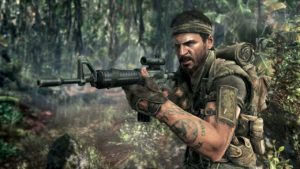 The action soon moves to Vietnam and the war-torn country is the setting for most of the middle section of the game. There is a risk of this section feeling like its own mini-campaign squidged between the wider Russian plot that begin and end the story, but there are enough connections to make it fit. While it’s true that Hudson’s missions in Hong Kong and Russia are more vitally important to this lauded narrative, Mason’s descent into darkness and insanity in Vietnam is perfect character exploration and pushes him towards his final actions.
The action soon moves to Vietnam and the war-torn country is the setting for most of the middle section of the game. There is a risk of this section feeling like its own mini-campaign squidged between the wider Russian plot that begin and end the story, but there are enough connections to make it fit. While it’s true that Hudson’s missions in Hong Kong and Russia are more vitally important to this lauded narrative, Mason’s descent into darkness and insanity in Vietnam is perfect character exploration and pushes him towards his final actions.
However, when Black Ops does Vietnam it does Vietnam. It has fun with all the tropes and movie references it can squeeze in, from the obligatory Creedence Clearwater Revival and The Rolling Stones soundtrack, to games of Russian roulette. Sometimes the game becomes a little too preoccupied with its references, of which I now get many more of than I did when I first played the game 10 years ago as a 14-year-old, but thankfully the characters remain engaging throughout.
It’s in Vietnam where I truly noticed the incredible atmosphere that the game is still able to create. The blood red skies trying to shine through the smoke in Hue City makes it seem as if you can smell the city burning around you. The same can be said for the incredible recreation of the Kowloon rooftops that offer parkour sequences with akimbo weapons, and the spine-chilling, colour-drained horrors of Reznov and his men being led to their deaths in the World War 2-set arctic flashback. I had completely forgotten about this WW2 mission that not only brought back waves of Black Ops nostalgia but World at War too. It’s amazing that, with the upcoming release of Cold War, a direct sequel to Black Ops, Treyarch’s timeline which began with World at War in 2008 is still going strong.
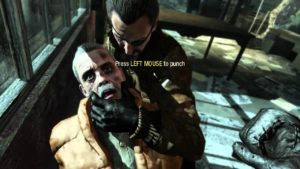 Also surprising me on this revisit was the level of violence on display. It’s a military shooter, it’s going to be violent, but I’ve been used to 2019’s Modern Warfare and was not expecting limbs and gore flying everywhere. A well-directed shotgun shell will take off a leg and leave it floating in a nearby river, pooling blood around it. I’m certainly not complaining, as I type this half wondering about all the imaginative and bloody ways John Wick could kill people in his next movie, but I can see the debate around the old ultraviolence. Given the real-life conflict the Vietnam missions are based on, is it better to show the brutal horrors of war or is lingering on bloodshed glorifying – or goryfying – the war? I found the most disturbing parts of the violence to be the aftermath: the way enemies’ eyes and mouths move slightly for a few seconds after they’re shot and lay dying on the ground as if uttering some final goodbyes.
Also surprising me on this revisit was the level of violence on display. It’s a military shooter, it’s going to be violent, but I’ve been used to 2019’s Modern Warfare and was not expecting limbs and gore flying everywhere. A well-directed shotgun shell will take off a leg and leave it floating in a nearby river, pooling blood around it. I’m certainly not complaining, as I type this half wondering about all the imaginative and bloody ways John Wick could kill people in his next movie, but I can see the debate around the old ultraviolence. Given the real-life conflict the Vietnam missions are based on, is it better to show the brutal horrors of war or is lingering on bloodshed glorifying – or goryfying – the war? I found the most disturbing parts of the violence to be the aftermath: the way enemies’ eyes and mouths move slightly for a few seconds after they’re shot and lay dying on the ground as if uttering some final goodbyes.
And while murdering your way across several continents may bring some remorse, it just feels great to do so. Again, being used to 2019’s Modern Warfare, Black Ops does feel its age but, as with the graphics, the gameplay almost works better upon a decadal retrospect. In truth, little has changed in the way Call of Duty plays but Black Ops is a less refined experience than the slight iterations of evolution we’ve gotten every year since. It’s quite clunky and doesn’t flow as well and yet it’s very satisfying to play. Although I’m sure nostalgia plays some role in that.
The game also sounds great; not just the score and featured music but the sound design too. Everything sounds older and grittier – purposefully so to match the horrible conditions of the Vietnam War. The ASMR-like satisfying clicks and clunks of perfectly fitting plastic and alloy guns being reloaded in Modern Warfare are instead replaced by the sound of coarse metal scraping against itself every time a FAMAS or 1911 is restocked. The type of noise you can feel in your teeth.
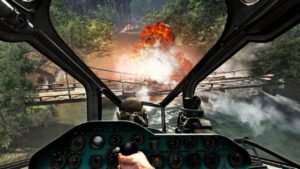 While Black Ops is primarily a boots-on-the-ground game, there a few vehicle missions that put you behind the controls of a motorcycle, a boat and a couple of helicopters. The helicopter missions still play surprisingly well and could easily be placed into the upcoming sequel Cold War without anyone knowing they were a decade old. It does feel a little floaty but hey, helicopters do kind of float. That is an issue in the boat mission however, despite boats also floating so I acknowledge my logic is flawed here. You control a sizable vessel packed with weaponry and yet it feels a light as a feather, as if it were a spaceship in Zero G, and you spend most of the mission bumping off the sides of the riverbank because of how surprisingly nimble the hunk of metal is. But at least you have the sounds of The Rolling Stones to distract you, both from the poor gameplay and the mass murder you’re committing.
While Black Ops is primarily a boots-on-the-ground game, there a few vehicle missions that put you behind the controls of a motorcycle, a boat and a couple of helicopters. The helicopter missions still play surprisingly well and could easily be placed into the upcoming sequel Cold War without anyone knowing they were a decade old. It does feel a little floaty but hey, helicopters do kind of float. That is an issue in the boat mission however, despite boats also floating so I acknowledge my logic is flawed here. You control a sizable vessel packed with weaponry and yet it feels a light as a feather, as if it were a spaceship in Zero G, and you spend most of the mission bumping off the sides of the riverbank because of how surprisingly nimble the hunk of metal is. But at least you have the sounds of The Rolling Stones to distract you, both from the poor gameplay and the mass murder you’re committing.
Overall, the game is very well paced when it comes to introducing and then answering mysteries. From it’s opening seconds, questions are literally being shouted at you. Over the course of the narrative many twists play out and the truth is discovered at logical, yet dramatic, points. Hudson’s the interrogator; Reznov is a figment of Mason’s twisted imagination; Mason was brainwashed; the truth behind the numbers; JFK’s death. The answers come quickly but also, pivotally, clearly. It’s certainly not impenetrable like the ending of Black Ops 3, which I still don’t fully understand. In what seems like an increasingly rare occurrence for these ‘mystery box’ stories, everything makes sense at the end and it’s a joy to replay the game, whether immediately or a decade later, to pick up on all the hints dotted throughout each mission.
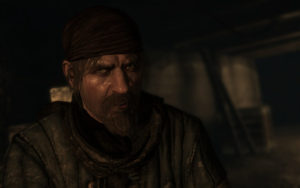 The truth behind Victor Reznov might simultaneously be the game’s greatest yet silliest twist of all. In Vorkuta, Mason was brainwashed by Dragovich and Steiner, but Reznov interrupted the sessions and installed his own conditioning into Mason, forcing him on a quest for revenge. Once Mason gets to Vietnam, he sees Reznov, who is believed to be a Russian defector, and yet he’s not really there and is only a creation of Mason’s broken mind. It’s a great reveal when we finally see Hudson’s perspective of Mason pretending that he’s Reznov, but it does pose some questions. When confined to the missions we see, Mason’s insanity is very well executed but was Mason seeing Reznov when the ‘cameras’ weren’t rolling? Did Woods or Bowman never catch Mason talking to himself any more than the small clues we see in missions?
The truth behind Victor Reznov might simultaneously be the game’s greatest yet silliest twist of all. In Vorkuta, Mason was brainwashed by Dragovich and Steiner, but Reznov interrupted the sessions and installed his own conditioning into Mason, forcing him on a quest for revenge. Once Mason gets to Vietnam, he sees Reznov, who is believed to be a Russian defector, and yet he’s not really there and is only a creation of Mason’s broken mind. It’s a great reveal when we finally see Hudson’s perspective of Mason pretending that he’s Reznov, but it does pose some questions. When confined to the missions we see, Mason’s insanity is very well executed but was Mason seeing Reznov when the ‘cameras’ weren’t rolling? Did Woods or Bowman never catch Mason talking to himself any more than the small clues we see in missions?
If Reznov was with Mason more than we saw then all credibility goes out the window but if it’s only constrained to what we, the player, witnessed then it’s a great twist. I remember it blowing my dumb 14-year-old mind the first time I played through the game. I then obsessed with going back and trying to catch all the clues of Reznov’s inexistence, which are played well with relatively subtle hints. Well, other than that one guy saying “what the fuck’s wrong with you?” after Mason talks to Reznov in the rat tunnels. I don’t know why it didn’t click then. Given the inordinate number of hallucinatory characters in modern TV shows (a plotline which The Leftovers executes the best), I think I would have guessed the twist if I had played the game for the first time today, but not necessarily the truth behind it. The fact that Reznov was just as much a manipulator as Dragovich is a deliciously dark direction for that fan favourite character, which I feel is often overlooked.
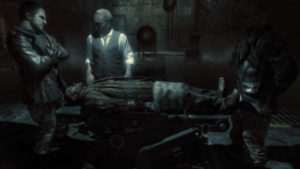 Mason’s sanity or lack thereof is a key aspect of the game and yet I can’t help thinking they could have done more with it. We cut back to ‘present day’ Mason in the interrogation chair a couple of times a mission for a few Dutch angles and high contrast lens flares, but considering we’re playing through his memories via a fractured psyche I wonder whether it should have altered the gameplay or locations more. This happens in one of the last missions, titled Revelations, where ceilings break away and reveal impossible sights, and the numbers are projected on shifting walls. While this could easily get annoying after a while and ruin the Reznov twist considering how insane Mason would appear throughout the game, I think more could have been done with the concept.
Mason’s sanity or lack thereof is a key aspect of the game and yet I can’t help thinking they could have done more with it. We cut back to ‘present day’ Mason in the interrogation chair a couple of times a mission for a few Dutch angles and high contrast lens flares, but considering we’re playing through his memories via a fractured psyche I wonder whether it should have altered the gameplay or locations more. This happens in one of the last missions, titled Revelations, where ceilings break away and reveal impossible sights, and the numbers are projected on shifting walls. While this could easily get annoying after a while and ruin the Reznov twist considering how insane Mason would appear throughout the game, I think more could have been done with the concept.
The truth is that I’m trying to find some negatives to the game in order to make this article more interesting but I’m coming up blank. There are a few minor story issues but nothing egregious. For example, Hudson keeps asks Mason what the numbers mean but at this point he already knows what they mean. It’s the location of the numbers station he should be after. The writers are keeping something a mystery for the audience even though the characters already know the answers to their questions. You also have to wonder whether Hudson could have just explained everything to Mason straight away instead of all the subterfuge, especially given the ticking clock, but then we wouldn’t have had a game. There are also a few other questions I have like how did Mason get to Rebirth Island so fast from Vietnam, and why would Dragovich reveal the location of the broadcast station in his message to the sleeper cells? But I see these very much as nitpicks rather than genuine complaints.
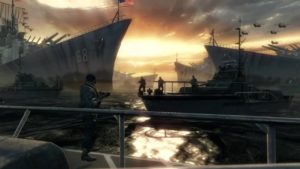 And so, with the truth revealed and the location of the broadcast station – which will send a message to Russian sleeper agents across America to release the bioweapon Nova 6 – revealed, Mason and Hudson head to the underwater location and destroy it in a fairly standard action finale. It’s a fun final mission but not as strong as many others in the game. Dragovich is killed, the base destroyed and our heroes surface to be welcomed by the US Navy and a preposterous number of ships and planes. Weaver says “we won” and rock music plays as the screen turns to black. Game over.
And so, with the truth revealed and the location of the broadcast station – which will send a message to Russian sleeper agents across America to release the bioweapon Nova 6 – revealed, Mason and Hudson head to the underwater location and destroy it in a fairly standard action finale. It’s a fun final mission but not as strong as many others in the game. Dragovich is killed, the base destroyed and our heroes surface to be welcomed by the US Navy and a preposterous number of ships and planes. Weaver says “we won” and rock music plays as the screen turns to black. Game over.
But wait! Something Dragovich said is playing on Mason’s mind, causing him to look back over film of Kennedy’s last few hours on November 22nd 1963. He sees himself in the crowd, something he doesn’t remember. Then the credits roll. It’s a perfect ending. The game begins with the failed assassination of Castro and ends with the reveal of the truth behind Kennedy’s assassination. His own weapon turned against him. They didn’t win. They lost, and it’s made even better with the contrast between that dour revelation and the overblown celebration after the station is destroyed. The fake ending and the true, redacted ending.
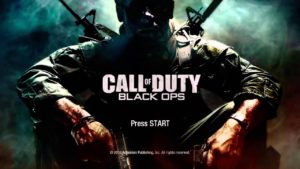 After revisiting it ten years later I’m confident in saying that Call of Duty: Black Ops is the franchise’s best game. While whichever game’s multiplayer modes and maps are the greatest is always up for debate – and I didn’t even tackle that much wider aspect of Black Ops in this retrospective – the first game in the Black Ops series has an outstanding narrative that’s incredibly well told and stands up when compared to the multitude of games which have followed, for no reason more so than how it treats and develops Alex Mason. His journey and the revelations therein are the lynchpin of every piece of the story. That gets me very worried about the narrative of Black Ops: Cold War because it has a silent protagonist who is nothing more than a surrogate for the player. Maybe you’re much more interesting than I am, but I feel I’m a pretty boring lead character for a Call of Duty game when compared to Mason and Hudson.
After revisiting it ten years later I’m confident in saying that Call of Duty: Black Ops is the franchise’s best game. While whichever game’s multiplayer modes and maps are the greatest is always up for debate – and I didn’t even tackle that much wider aspect of Black Ops in this retrospective – the first game in the Black Ops series has an outstanding narrative that’s incredibly well told and stands up when compared to the multitude of games which have followed, for no reason more so than how it treats and develops Alex Mason. His journey and the revelations therein are the lynchpin of every piece of the story. That gets me very worried about the narrative of Black Ops: Cold War because it has a silent protagonist who is nothing more than a surrogate for the player. Maybe you’re much more interesting than I am, but I feel I’m a pretty boring lead character for a Call of Duty game when compared to Mason and Hudson.
Black Ops is due a remaster and, like with Modern Warfare 2 earlier in the year, I wouldn’t be surprised if next year we receive one, especially considering Treyarch have returned to these characters in Cold War. I’m looking forward to such a possibility but if this recent playthrough has shown me anything it’s that the original game holds up and is still the pinnacle of Call of Duty ten years after its release.
Have you played the original Black Ops lately? Which Call of Duty campaign is your favourite? Let me know in the comments and be sure to geek out with me about TV, movies and video-games on Twitter @kylebrrtt.




